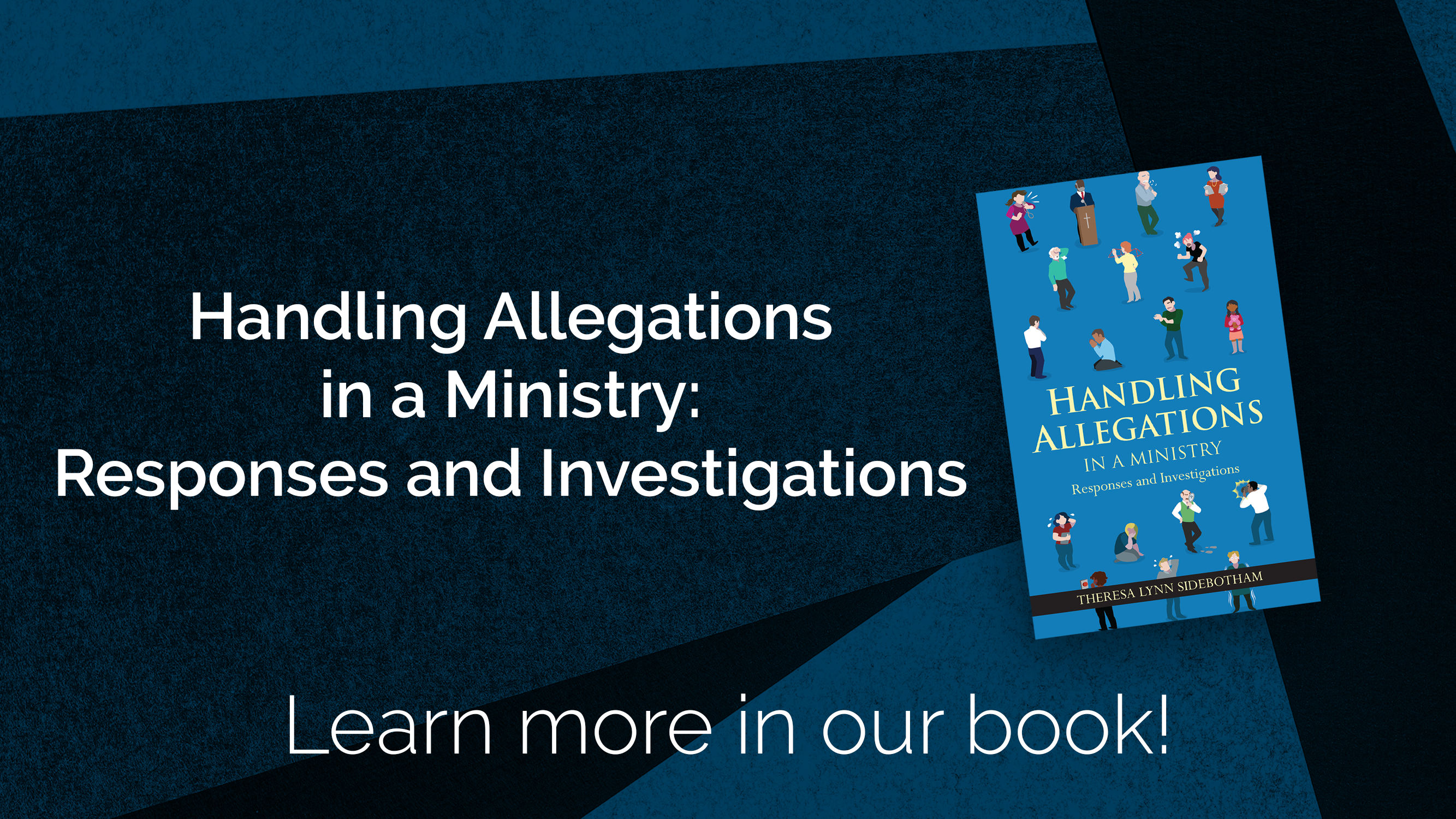Investigations and Abuse/Misconduct Prevention
Workplace and Ministry Investigations: Misconduct Response for Protecting People and Upholding Core Values
Misconduct in ministries and workplaces can leave victims with deep emotional scars: "Why did this happen? Why didn’t my leaders protect me?" When survivors feel unheard, it can erode trust in leadership and compromise an organization’s foundational values.
Telios Law offers ministries and businesses a comprehensive approach to preventing and addressing misconduct. From proactive policies to independent investigations, we empower leaders to safeguard their members and employees and to maintain an ethical environment grounded in values of integrity and care.
Check out our FAQ or Read our Book on Investigations
We Lead Investigations
At Telios Law, we conduct impartial investigations into the following areas:
- Sexual harassment or gender issues;
- Discrimination of various types;
- Workplace threats or violence;
- Inappropriate conduct or ethical breaches;
- Abuse of power in leadership;
- Child abuse;
- Historic or international investigations; and
- Leadership failure or accountability.
We assist organizations in evaluating when an investigation is necessary and how to structure it in a neutral and impartial way to ensure all parties are heard and due process is respected.
Our approach includes considerations such as administrative leave, safety plans, and supporting affected individuals and stakeholders. A trauma-informed investigation process ensures that actions taken are compassionate and address both disciplinary measures and the well-being of those impacted.
Best Practices for a Safe, Ethical Workplace
Following best practices in investigations is essential for:
- Ensuring that complaints are thoroughly investigated and taken seriously;
- Keeping stakeholders safe;
- Providing the accused with a fair and transparent process;
- Avoiding common investigative errors that could lead to increased legal risk;
- Addressing misconduct swiftly and fairly, without retaliation against whistleblowers;
- Acting with fairness to minimize liability exposure; and
- Cultivating an organizational culture of trust, accountability, and safety, where misconduct is addressed swiftly and fairly, without retaliation, and necessary cultural changes are implemented.
Visit Telios Investigations to learn more
Relevant Resources:
Investigation FAQs—Tough Questions and Transparent Answers
Investigations are complicated and messy, because they involve human behavior—both in the allegations and the investigative process. Here are some common questions about how the messiness plays out. Read the FAQ here.
Navigating Allegations with Care: FAQ for Investigative Best Practices and Healing
This FAQ provides insights into investigation best practices, from addressing sensitive allegations to implementing trauma-informed approaches. Learn how to avoid legal pitfalls, maintain fairness, and create a safe environment for all. Whether you’re navigating workplace misconduct or safeguarding vulnerable individuals, this guide equips you with the tools to act with confidence and integrity. Read the FAQ here.
Theresa Sidebotham on Ministry Investigations: A TableTalk Podcast
In a TableTalk podcast hosted by the Hendricks Center, Kymberli Cook and Theresa Lynn Sidebotham discuss best practices for conducting investigations within churches and ministries, common mistakes to avoid, and how to ensure integrity and fairness throughout the process. Listen or watch here!
More Ways Telios Law Can Help Your Business
Subscribe to our "Telios Tips" emails for a monthly, educational hot take on legal matters that could affect your organization.
Ministry & Religious Law Updates
BusinessSafe: Legal Updates for Businesses
Please Note: By signing up you are agreeing to Telios Law's Privacy Policy.
Allegations of misconduct can create liability and destroy relationships. But a misconduct allegation handled well protects the innocent. To learn more about our manager-level training for how to steer your organization through an investigation, check out our training at Telios Teaches.
Telios Teaches: Investigation Training
This post cautions about what not to do in an internal employment investigation and provides four helpful tips to avoid mishandling a complaint of sexual harassment.
How should an organization respond to a complaint of sexual harassment? This post provides an overview of how to respond effectively to address and prevent sexual harassment.
Learn how to perform a review or audit of your organization’s internal processes for important policies for practical and legal compliance.

A multi-chapter resource about employment investigations for religious organizations, including the importance of these investigations and how to develop a framework for conducting them.

A downloadable resource by Theresa Lynn Sidebotham, Esq. about how "although allegations of leadership misconduct are one of the hardest things for ministries to handle, they offer a great opportunity to seek truth and justice and to minister to people."
In a perfect world, no one would file reports of child abuse unless they were really true. But it happens all the time—in fact, most of the reports that go to the Department of Human Services are unfounded. What should you do if a DHS caseworker shows up at your door?

A multi-chapter resource by Theresa Lynn Sidebotham, Esq. and Dr. Brent Lindquist about how to guide your organization through the shock of terminating a staff member.

A multi-chapter resource by Theresa Lynn Sidebotham, Esq. and Dr. Brent Lindquist about whistle-blowing and retaliation, and how important it is to have good policies and an internal investigation process.

